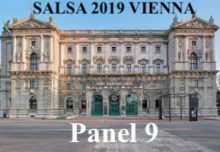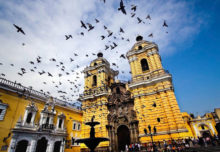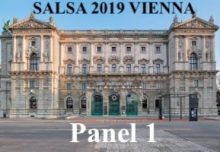PANEL 07: Addressing Power Asymmetries: Hopes and Experiences of New Forms of Participation and Collaboration in Lowland South America
SALSA XII Sesquiannual Conference – Vienna, 2019
 Organizers:
Organizers:
Andrea M. Vásquez Fernández, University of British Columbia, Canada
Giancarlo Rolando Betancourt, University of Virginia, USA
Juan Pablo Sarmiento Barletti, Center for International Forestry Research
Evan Killick, University of Sussex, UK
Chairs: Giancarlo Rolando Betancourt (panel chair); Evan Killick, Juan Pablo Sarmiento Barletti & Andrea M. Vásquez Fernández (session chairs)
This panel explores the possibilities and weaknesses of participatory and collaborative approaches in engaging with the continued economic, social and political marginalisation of Indigenous Peoples across Latin America. Based on experience or plans for new forms of research and relationships with Peoples of Lowland South America or on research on the collaborative approaches of others the papers will address the recent academic, political and public calls for participatory approaches and a wider decolonization of research, theories and methodologies. While we would suggest that the importance of participative methods and forms of collaboration have long been evident in the work and activities of many scholars, advocates and workers in the region there is nevertheless a need to assess their relative success as well as to refine and propose concrete and enduring forms of collaboration based around symmetrical relations. This panel seeks ways in which changing the methodologies and practices of research might be part of solving the problem of its potential complicity in existing hierarchical regimes while also continuing to critically engage with the regions’ populations and issues.Papers on the panel will be given by individuals working at the intersection of Indigenous demands and scholarly research in a range of different fields and contexts. Papers will engage with questions about how research can support Indigenous Peoples as well as the limitations and restrictions such efforts face. Other questions will be how this responsibility translates into research agenda-setting, methodological decisions, and forms of knowledge co-production and dissemination.
Resumen: Este panel explora las posibilidades y debilidades de los enfoques participativos y colaborativos en relación a la continua marginalización económica, social y política de los Pueblos Indígenas en América Latina. En base a experiencias previas o planes futuros en torno a nuevas formas de hacer investigación y establecer relaciones con Pueblos de las tierras bajas sudamericanas, o en base a investigaciones sobre enfoques participativos realizados por terceros, las ponencias de este panel abordarán las recientes exhortaciones académicas, políticas y públicas en pro enfoques participativos y una descolonización más profunda de la investigación, teorías y metodologías. Al mismo que sugerimos que la importancia de metodologías y formas de colaboración participativas han sido evidentes durante mucho tiempo en el trabajo y actividades the diversos intelectuales, activistas y trabajadores de la región, existe aún la necesidad de evaluar su éxito relativo y refinar y proponer formas concretas y duraderas de colaboración cimentadas en relaciones simétricas. Este panel busca formas en las cuales cambiar las metodologías y prácticas de investigación puede contribuir a solucionar el problema de su potencial complicidad con los regímenes jerárquicos existentes y, al mismo tiempo, seguir trabajando críticamente con la población y los asuntos de la región. Las ponencias de este panel serán presentadas por individuos que trabajan en la intersección de demandas indígenas e investigación académica en un rango de diferentes disciplinas y contextos. Las presentaciones abordarán preguntas relacionadas al modo en que la investigación puede respaldar a los Pueblos Indígenas, así como los límites y restricciones de este tipo de esfuerzos. Otras preguntas a ser abordadas serán: cómo esta responsabilidad se manifiesta en la definición de la agenda de investigación, decisiones metodológicas y formas de coproducción y difusión de conocimiento.
Panel Schedule
Panel chair: Giancarlo Rolando Betancourt
Friday, 28 June, WMW Forum |
||
Session 1 (chair: Evan Killick) |
||
| 11:40 | 12:00 | Thomas Niederberger. Productive contradictions? Practicing engaged anthropology with the Autonomous Government of the Wampis Nation (Peruvian Amazon). |
| 12:00 | 12:20 | Andrea M. Vásquez Fernández. Mutual Respect? A collaborative project with the Asheeninka and Yine Peoples from the Peruvian Amazon. |
| 12:20 | 12:40 | Discussion |
Session 2 (chair: Juan Pablo Sarmiento Barletti) |
||
| 14:30 | 14:50 | Giancarlo Rolando Betancourt. Trouble in Paradise: collaboration and participatory conservation. |
| 14:50 | 15:10 | Luis Felipe Torres Espinoza. What does it mean to “protect”?: A Yine approach to rights protection policies for isolated indigenous peoples (Madre de Dios. Peru). |
| 15:10 | 15:30 | Leonidas Oikonomakis. From the Rainy Place to the Burnt Palace: How Social Movements form their Political Strategies. The Case of the Six Federations of the Tropic of Cochabamba. |
| 15:30 | 15:50 | Evan Killick. Decolonial Limitations? A consideration of apparent barriers to equalizing research and collaboration in Peruvian Amazonia. |
| 15:50 | 16:10 | Discussion |
Session 3 (chair: Andrea M. Vásquez Fernández) |
||
| 16:40 | 17:00 | Jeremy Campbell. A Land Ethic for Amazonia: Territorial Auto-demarcation and Interethnic Collaborations in the Tapajós Valley. |
| 17:00 | 17:20 | Volker von Bremen. Gestión Territorial – Un desafío para la cooperación indígena? |
| 17:20 | 17:40 | Mauricio Caviedes. Enseñar marxismo entre los Uitoto: La experiencia de un antropólogo promoviendo el movimiento indígena amazónico. |
| 17:40 | 18:00 | Juan Pablo Sarmiento Barletti. Who represents whom? The challenges of collaboration and representation in Loreto’s Mesa PIACI (Peruvian Amazon). |
| 18:00 | 18:20 | Discussion |











